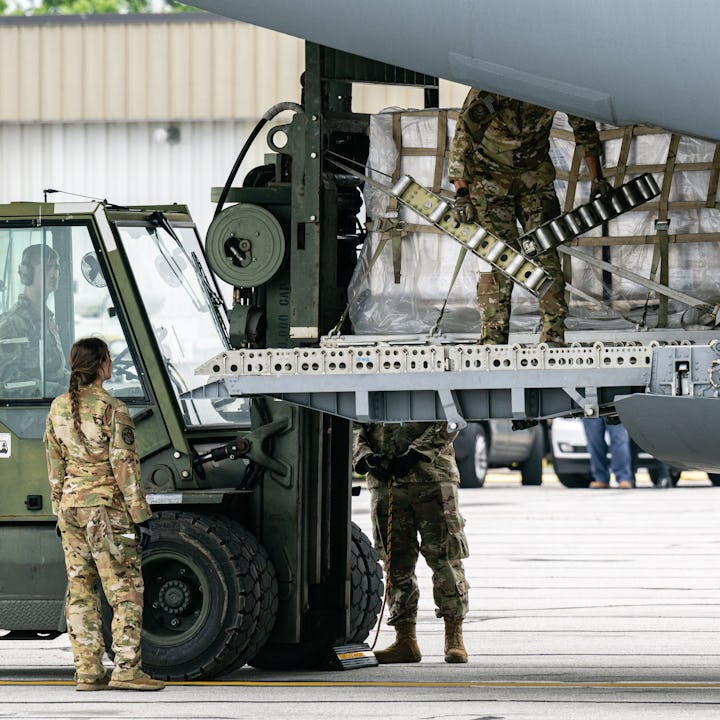US Flies In 35 Tons Of Emergency Hypoallergenic Baby Formula From Germany
The first delivery of Operation Fly Formula will provide enough formula for 9,000 babies and 18,000 toddlers for one week.

The baby formula shortage quickly became — and has been — a crisis. On Sunday, the first of several shipments of emergency baby formula arrived in Indianapolis, Indiana, on a US military plane from Germany.
The emergency shipment contains 78,000 pounds of hypoallergenic infant baby formula, but none of it will be immediately hitting the still-empty shelves of supermarkets. Instead, this shipment is set to be distributed to those most in need — namely babies who are intolerant of protein in cow milk.
“It is a large shipment of very specific and specialized formula. Formula for moms and dads who have children who have allergies where the regular formula just simply will not work,” Agriculture Secretary Tom Vilsack said at a press conference in Indianapolis shortly after the shipment arrived.
This particular shipment contained pallets of Nestlé Health Science formula, including Alfamino Infant and Alfamino Junior.
As to where these supplies will be distributed, a Biden administration official told CNN that the formula will be given to hospitals, doctors, pharmacies, and health care facilities in areas of the country “where the needs are most acute.”
Still, Brian Deese, director of the White House National Economic Council, notes that people shouldn’t have to wait long until formula also starts to hit shelves, telling CNN’s State of the Union that people should see “more formula in stores starting as early as this week.”
The White House also announced that the second Operation Fly Formula flight is set to transport “114 pallets of Gerber Good Start Extensive HA infant formula,” another hypoallergenic formula for children allergic to cow’s milk protein, later this week.
Abbott Nutrition — the company that continued to produce infant formula with deadly bacteria due to alleged lax regulations at the Sturgis, Michigan, plant that produces 25% of the nation’s baby food — has also worked out a deal with the Food and Drug Administration to make sure they get access to ingredients and supplies to quickly make baby formula.
Which, if memory serves correctly, is what got the country in this mess in the first place. Deese also noted that the U.S. needs more formula providers “so that no individual company has this much control over the supply chains.”
Progressive lawmakers agree, and representatives Jamaal Bowman (NY), Ayanna Pressley (Mass.), Pramila Jayapal (WA), and Grace Meng (NY), sent a letter to President Biden urging him to not only address the shortage, but to hold Abbott Nutrition accountable.
“The harm this corporate greed and industry oligopoly have caused cannot be overstated,” the letter says.
“In the same month that health hazards were identified and ignored at Abbott Nutrition’s facility, their sales grew, despite pandemic woes. Abbott Nutrition’s near monopoly has made the American public all the more vulnerable to the harmful consequences of pandemic profiteering.”
If you need help finding formula during the infant formula shortage, the U.S. Department of Health & Human Services has a list of available community resources.